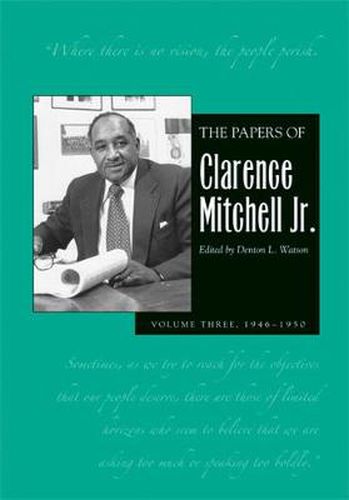Readings Newsletter
Become a Readings Member to make your shopping experience even easier.
Sign in or sign up for free!
You’re not far away from qualifying for FREE standard shipping within Australia
You’ve qualified for FREE standard shipping within Australia
The cart is loading…






Born in Baltimore in 1911, Clarence Mitchell Jr. led the struggle for passage of the 1957 Civil Rights Act, the 1960 Civil Rights Act, the 1964 Civil Rights Act, the 1965 Voting Rights Act, and the 1968 Fair Housing Act. Volume III documents the extent to which Mitchell, as labor secretary for the National Association for the Advancement of Colored People and then director of the NAACP’s Washington Bureau, made his program for the creation of a permanent Fair Employment Practices Commission central to his quest for presidential leadership in civil rights. As a result of Mitchell’s work in this period, President Truman in 1948 issued an order barring discrimination in federal employment and created a board to review discrimination complaints. The Supreme Court’s Brown v. Board of Education decision in 1954 - a ruling that in effect said segregation and discrimination were one - cleared the path for Mitchell to intensify his fight for passage of civil rights laws that were grounded in the Equal Protection Clause of the Fourteenth Amendment. Volume III is an invaluable reference in tracing Mitchell’s greatest contribution to the strengthening of American democracy by getting Congress, the courts, and the executive branch to join together in upholding the constitutional rights of African Americans.
$9.00 standard shipping within Australia
FREE standard shipping within Australia for orders over $100.00
Express & International shipping calculated at checkout
Born in Baltimore in 1911, Clarence Mitchell Jr. led the struggle for passage of the 1957 Civil Rights Act, the 1960 Civil Rights Act, the 1964 Civil Rights Act, the 1965 Voting Rights Act, and the 1968 Fair Housing Act. Volume III documents the extent to which Mitchell, as labor secretary for the National Association for the Advancement of Colored People and then director of the NAACP’s Washington Bureau, made his program for the creation of a permanent Fair Employment Practices Commission central to his quest for presidential leadership in civil rights. As a result of Mitchell’s work in this period, President Truman in 1948 issued an order barring discrimination in federal employment and created a board to review discrimination complaints. The Supreme Court’s Brown v. Board of Education decision in 1954 - a ruling that in effect said segregation and discrimination were one - cleared the path for Mitchell to intensify his fight for passage of civil rights laws that were grounded in the Equal Protection Clause of the Fourteenth Amendment. Volume III is an invaluable reference in tracing Mitchell’s greatest contribution to the strengthening of American democracy by getting Congress, the courts, and the executive branch to join together in upholding the constitutional rights of African Americans.